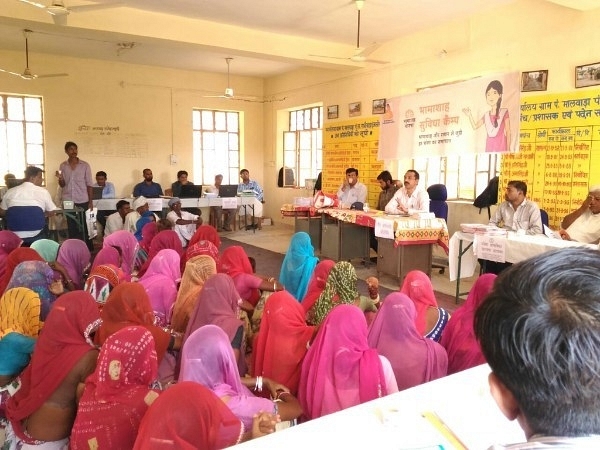Economy
Three Cheers For Bhamashah As It Scores Big On Financial Inclusion, Women Empowerment And Service Delivery
- Rajasthan’s poor are welcoming the Bhamashah Yojana as it is delivering effectively on three important counts – financial inclusion, women improvement and service delivery.

Bhamashah Suvidha Camp
The Government of India’s subsidy bill runs in lakhs of crores. On top of that, there are separate welfare programmes at the state level. Until 2014, the system of subsidy delivery to the poor was poorly managed. It was leaky, inefficient and serving as a vehicle for middleman to make easy moolah. However, things have changed a lot in the last three years. The welfare delivery setup is now transparent and convenient. The government is saving thousands of crores, and the benefits are reaching those for whom it is intended.
This transformation was brought about with the help of three elements. Aadhaar – a programme conceived by the previous United Progressive Alliance (UPA) government – is one of them. It remained directionless for years and was thought of as another scheme like the population register or the ration card until Prime Minister Narendra Modi came in and turned it into a powerful policy tool by combining it with his Jan Dhan initiative, under which crores of new bank accounts were opened for the poor. Today, the Supreme Court is hearing a case where the government’s decision to link Aadhaar with bank accounts is in the dock.
Whatever is the judgment of the apex court, the government will eventually have to create a system which protects data and ensures greater privacy. It’s slowly moving in that direction and India’s new data protection regime is taking shape.
Meanwhile, the poor are welcoming the new welfare regime. A survey, by the Center for Global Development (CGD), of 633 beneficiaries of Rajasthan government’s Bhamashah scheme proves this to be the case. The scheme’s aim is to spur financial inclusion, promote women empowerment and improve service delivery of welfare schemes.
Bhamashah was envisaged by the state government as an umbrella programme to deliver all cash and kind welfare transfers to the poor households. Under the programme, a woman must be the head of the family.
Regarding financial inclusion, the CGD survey found that nearly all households now have at least one bank account while the maximum number of those surveyed said there were two bank accounts in their household.
As far as empowerment of women is concerned, the CGD survey found that the Bhamashah scheme did indeed help the state in moving in a positive direction. Of those surveyed, 66 per cent of the female heads of households (according to the scheme) said they didn’t have a bank account prior to registering for this programme. As many as 90 per cent of those surveyed said they had linked their bank accounts with Aadhaar.
According to the CGD, “76 per cent expressed a strong preference for bank branches and 23 per cent preferred ATMs; almost none used bank or business correspondents. Remarkably, 54 per cent of households reported that women travel to withdraw cash most often, more so when the cash point is not very close.”
Improving service quality was the third key objective of Bhamashah. On this parameter too, the scheme has delivered positively in the eyes of the poor. Those surveyed reported that the new welfare system was better as there was no hassle of dealers in case of delivery of LPG cylinders (under PAHAL scheme), and with biometric authentication for PDS, it became difficult to divert their ration into the black market.
However, when it comes to biometric authentication, not everyone is equally happy because as many as one quarter of the number of respondents said they found it hard to authenticate themselves in a timely manner. While 71 per cent of the recipients said they could authenticate in one or two attempts, 4 per cent were denied ration as they couldn’t authenticate their credentials for various reasons. Clearly, this issue needs to be sorted out at the earliest.
Overall, the Rajasthan government’s Bhamashah is delivering in spades for the poor – thanks to direct benefit transfers enabled by the universalisation of Aadhaar cards and bank accounts.
All data and graphs used herein are sourced from the Center for Global Development.
Introducing ElectionsHQ + 50 Ground Reports Project
The 2024 elections might seem easy to guess, but there are some important questions that shouldn't be missed.
Do freebies still sway voters? Do people prioritise infrastructure when voting? How will Punjab vote?
The answers to these questions provide great insights into where we, as a country, are headed in the years to come.
Swarajya is starting a project with an aim to do 50 solid ground stories and a smart commentary service on WhatsApp, a one-of-a-kind. We'd love your support during this election season.
Click below to contribute.
Latest